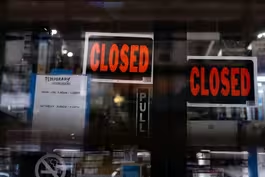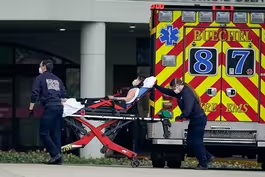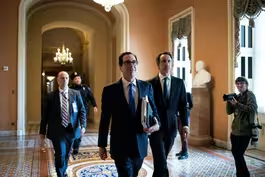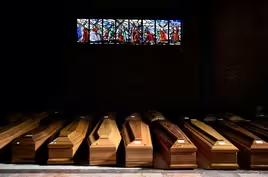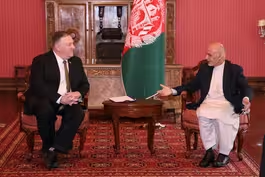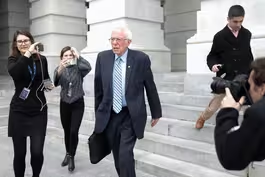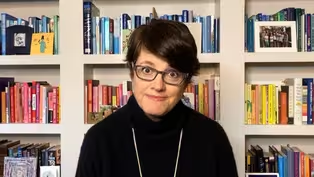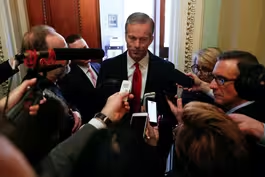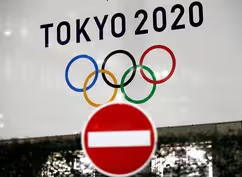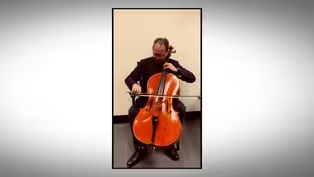
March 24, 2020 - PBS NewsHour full episode
3/24/2020 | 56m 45sVideo has Closed Captions
March 24, 2020 - PBS NewsHour full episode
March 24, 2020 - PBS NewsHour full episode
Problems playing video? | Closed Captioning Feedback
Problems playing video? | Closed Captioning Feedback
Major corporate funding for the PBS News Hour is provided by BDO, BNSF, Consumer Cellular, American Cruise Lines, and Raymond James. Funding for the PBS NewsHour Weekend is provided by...

March 24, 2020 - PBS NewsHour full episode
3/24/2020 | 56m 45sVideo has Closed Captions
March 24, 2020 - PBS NewsHour full episode
Problems playing video? | Closed Captioning Feedback
How to Watch PBS News Hour
PBS News Hour is available to stream on pbs.org and the free PBS App, available on iPhone, Apple TV, Android TV, Android smartphones, Amazon Fire TV, Amazon Fire Tablet, Roku, Samsung Smart TV, and Vizio.
Providing Support for PBS.org
Learn Moreabout PBS online sponsorshipJUDY WOODRUFF: Good evening.
I'm Judy Woodruff.
On the "NewsHour" tonight: a cascading crisis.
India locks down 1.3 billion citizens, the Olympics are postponed, and the rate of infection in New York skyrockets.
We examine the latest in the COVID-19 pandemic.
Then: debating a rescue plan.
With the country watching, the U.S. Senate pushes to pass an aid package to blunt the economic fallout of coronavirus.
Plus: inside the epicenter.
Italy's battle with the pandemic could be a warning sign of what's to come for the U.S. DR. ANDREA CRISANTI, Professor, Imperial College London: If you find a cluster case, with experience that we have in Italy, you really need to bring the place to a standstill.
Nobody moves for three to four weeks, and you do tests, as many as possible, around the place where the cluster has appeared.
There's no other way.
JUDY WOODRUFF: All that and more on tonight's "PBS NewsHour."
(BREAK) JUDY WOODRUFF: President Trump is talking tonight about reopening the country for business soon.
That comes as coronavirus infections in the United States exceed 50,000, with more than 600 deaths.
Meanwhile, New York state warned of increasingly desperate conditions today.
But, in financial markets, the Dow Jones industrial average surged 11 percent.
That's the most since 1933, as an economic rescue bill progressed in the U.S. Senate.
Amna Nawaz begins our coverage.
AMNA NAWAZ: In the city that never sleeps, empty streets, as coronavirus cases surge in New York, making it the new epicenter for the United States.
New York Governor Andrew Cuomo warned today of dire consequences in his state and the rest of the country.
GOV.
ANDREW CUOMO (D-NY): As the number of cases go up, the number of people in hospital beds goes up, the number of people who need an ICU bed and a ventilator goes up, and we cannot address that increasing curve.
Where we are today, you will be in three weeks or four weeks or five weeks or six weeks.
We are your future.
AMNA NAWAZ: The World Health Organization issued a similar caution, saying the U.S., now responsible for 40 percent of new COVID-19 cases, could become the global epicenter of the pandemic.
Around the world, extraordinary steps in some countries to contain further virus spread.
In the world's second-most populous nation, a 21-day lockdown for India's 1.3 billion residents, announced today by Prime Minister Narendra Modi.
NARENDRA MODI, Indian Prime Minister (through translator): From 12:00 midnight today, the entire country will go under a complete lockdown.
To save India, there will be a total ban on venturing out of your homes.
AMNA NAWAZ: The Summer Olympic Games, which have historically only been canceled in times of war, were postponed today by host Japan.
SHINZO ABE, Japanese Prime Minister (through translator): For the athletes, the athletes of the world, for them to be able to compete in the best environment, and also for the Games to be won, which are safe and worry-free for spectators, I asked if it would be possible to consider postponing the Games for approximately a year.
AMNA NAWAZ: And in Spain, among the hardest-hit countries in Europe, the death toll has so overwhelmed the system, a Madrid ice rink is being used to house the dead.
Here in the United States, as cases continue to rise, over a dozen states have imposed additional stay-at-home restrictions in recent days.
Even as health officials urge continued social distancing, President Trump today at a FOX News town hall said he'd like to see those restrictions ease by Easter, less than three weeks away.
DONALD TRUMP, President of the United States: We have had bad epidemics.
I'm sure they could have been called pandemics.
But we never did anything like this before, but I had to do it.
It's been very painful for our country and very destabilizing for our country, but we have to go back to work, much sooner than people thought.
And people can go back to work, and they can also practice good judgment.
AMNA NAWAZ: Lawmakers looking to mitigate the economic impact with a stimulus deal pressed on with negotiations today, expressing confidence for the first time in days.
SEN. MITCH MCCONNELL (R-KY): Now, at last, I believe we are on the five-yard line.
The American people need our Democratic friends to take yes for an answer.
SEN. CHUCK SCHUMER (D-NY): We all know that not everyone is going to want every provision.
We all know that there are many things that so many of us want are left out, but we all know that we must do these things.
AMNA NAWAZ: At the White House this morning, National Economic Council Director Larry Kudlow said the deal will speed up recovery.
LARRY KUDLOW, Director, National Economic Council: Public health includes economic health.
That's the key point.
And it's not either/or.
AMNA NAWAZ: But as the U.S. braces for an even greater impact, signs of recovery in China.
In Hubei province, ground zero for the virus, main streets came back to life, and officials said outbound travel restrictions for many cities will be lifted tomorrow.
Still, health officials here say vigilance will remain high.
ZOU YU, Wuhan Health Official (through translator): If the community is identified as an epidemic-free area, residents who need to return to work will be allowed to enter and leave the residency with a green health code and a certificate from the employer.
AMNA NAWAZ: Slowly easing restrictions, and cautiously adjusting to a new normal.
For the "PBS NewsHour," I'm Amna Nawaz.
JUDY WOODRUFF: As Amna just reported, the world's second most-populous country is on lockdown tonight.
India is taking this drastic move at the order of its prime minister to stem the outbreak there, in a country with a less-than-reliable health care system, widespread poverty and underserved populations.
Special correspondent Neha Poonia in Delhi brings us up to date.
NEHA POONIA: In a televised address to the entire nation, Prime Minister Modi said that every Indian, all 1.3 billion of them, must forget what it's like to step outside their homes for the next 21 days.
Prime Minister Modi announced a complete nationwide lockdown, while citing the example of Italy and the U.S., saying that when developed countries with robust health care setups have been unable to stop a mass outbreak, India stands no chance, unless every Indian stays indoors and self-isolates.
Essential services will continue to operate during the next three weeks.
This includes hospitals, pharmacies, grocery stores, but all air, land and rail travel has been banned entirely.
Prime Minister Modi also announced a nearly $2 billion investment in India's health care infrastructure setup.
This money, over the next few weeks, will be used by testing kits, hazmat suits, ventilators, as well as to train medical staff.
Critics say India's biggest challenge is the fact that its public health care setup is overstretched and underfunded, and the government seems to be addressing some of that criticism through this move.
The prime minister, however, was silent on why India isn't testing more people.
The government claims that, because there is no community transmission, there's no need to test everyone, and that mass testing will only lead to more panic on the ground.
India can test 10,000 people daily, but, in the last two months, it's only tested 20,000 people.
JUDY WOODRUFF: That is special correspondent Neha Poonia in New Delhi.
And, as we mentioned, Wall Street soared today, on hopes that the U.S. Senate would approve an economic rescue plan.
The Dow Jones industrial average gained a record 2,100 points to close at 20705.
The Nasdaq rose 557 points, and the S&P 500 added 210.
For more on the rescue plan, and other efforts to battle the pandemic, we turn again to Lisa Desjardins at the Capitol, and to Yamiche Alcindor at the White House.
To Lisa, I'm going to start with you first.
Individual Americans, in particular those who may become unemployed as a result of the coronavirus, what's in this plan for them?
LISA DESJARDINS: Well, that's important.
First of all, an update.
We are still waiting to see the plan and the text.
And we do not know yet if there will be a vote tonight.
It looks more likely a vote tomorrow on this, as they're putting ink on paper.
Judy, absolutely, this is what Americans want to know.
Let's start with those who have lost their jobs or could lose their jobs.
Here's what's in this for them for the unemployed.
There would be up to $600 over usual unemployment benefits for each person.
That would mean close to full pay for most Americans, not every, but for most middle-class Americans, you could get an unemployment benefit of full pay.
That is for four months, Judy.
And that is an increase over the original plan for this bill.
JUDY WOODRUFF: And, Lisa, we know another important piece of this legislative plan has to do with small businesses.
Tell us about what's in there for that for them.
LISA DESJARDINS: This is the part that they agreed on the earliest, but here's where we are, $350 billion in loans for small businesses.
Now, those loans will become grants, essentially, they will be forgiven, if those small businesses keep those workers on the payroll, keep those workers paid.
And the Treasury Department, I'm told, has a provision in this where they can use tax credits to cut those checks more quickly than usual, get that loan money out more quickly for small businesses, small businesses making up 48 percent of the work force here in America.
JUDY WOODRUFF: And now to you, Yamiche.
Another part of this, of course, has to do with the larger businesses, corporations.
And we know that this is an area where the White House apparently gave ground on.
What do we know about that?
YAMICHE ALCINDOR: That's right.
Well, the president says that he's eager to get a bill passed in Congress.
And in doing so, the White House, they say, made compromises.
To put up some of the compromises that they made, it's dealing with large corporations.
There's going to be $500 billion going for these large business loans.
There's going to be now an inspector general and an oversight board to look at how Secretary Mnuchin, Treasury Secretary Mnuchin, disburses these loans.
And then Treasury Secretary Mnuchin himself will have to answer to Congress.
So, he will be able to have -- be called up to Congress to answer questions.
So, what we see here is the White House saying, look, we want to make a deal.
Democrats, they were saying at one point, were trying to add all sorts of things that they thought was not related to the coronavirus bill.
But we now see the White House really moving closer and closer to having that deal done.
JUDY WOODRUFF: And we know at the same time, Yamiche, this is a -- I'm sorry -- to Lisa now.
Let me come back to you on this.
This is a bill that does deal more than with just businesses.
It also is going to have some help for hospitals, for states.
Tell us more about that part of it.
LISA DESJARDINS: That's right.
Some important provisions in here, Judy.
We're told that it has $130 billion in it for hospitals, including rural hospitals, $150 billion for states, counties and cities, for local governments.
And then also, Judy, this has in it, we're told, a freeze on federal student loan payments.
Now, Judy, we want all the details of all this.
The details are important.
We're waiting.
But one big detail, Judy, we're told the price tag is over 200 and -- I'm sorry -- $2 trillion.
Judy, that would make that the largest single bill in American history, the longest -- largest single legislative measure for one-time spending in history.
JUDY WOODRUFF: And just quickly, Lisa, at this point, we think we know everything that's in there, or not?
LISA DESJARDINS: We don't.
We don't know.
We don't know what's in it all the way, not yet.
JUDY WOODRUFF: Ah.
And, again, on timing, Lisa, you said it may not be tonight.
LISA DESJARDINS: Right.
It may not be tonight, could be tomorrow.
JUDY WOODRUFF: So, finally, Yamiche, let me come back to you on the -- with this last question.
And that is what the president had to say today about getting the country back to business.
It's something he raised yesterday.
He spoke more about it today.
YAMICHE ALCINDOR: That's right, Judy.
President Trump is making it crystal clear that he wants to try to ease the coronavirus guidelines that the White House issued, which were focused on social distancing and telling people not to be in groups of larger than 10, by April 12.
That would be Easter Sunday.
The president said he wants to see churches packed by then.
Now, health officials have stressed repeatedly that this coronavirus outbreak could last all the way into the summer.
President Trump himself has said that this could last until August.
But the president is making clear that he wants to ease those guidelines.
He says that he believes more people will die if the economy is slowed down than if the virus hurts people or kills people.
So, the president there is stressing that.
But it's not clear whether or not he's getting that guidance and that data from health officials.
The other thing to note, Judy, is that the president is getting pushed still by governors to enact the Defense Production Act.
The president just now -- he's still speaking at the White House in this hour at a White House briefing.
He's saying that he still doesn't need to do that act, that, instead, American companies are volunteering, and there's enough medical equipment being made to meet the needs of hospitals all across the country.
JUDY WOODRUFF: So, still not using the full federal power that he has?
YAMICHE ALCINDOR: That's right.
JUDY WOODRUFF: All right.
So much to follow.
Yamiche Alcindor, Lisa Desjardins, thank you both.
YAMICHE ALCINDOR: Thanks.
JUDY WOODRUFF: We appreciate it.
In the day's other news: Afghanistan's President Ashraf Ghani and his political rival, Abdullah Abdullah, blamed each other for a U.S. threat to cut $1 billion in aid.
Secretary of State Mike Pompeo made the threat after meeting with both men in Kabul.
He warned that they must form a government and begin talks with the Taliban.
The New York Times and The Washington Post and The Wall Street Journal are urging China today not to expel their journalists.
In an open letter, they said the move is -- quote - - "threatening to deprive the world of critical information at a perilous moment."
Beijing acted after the Trump administration limited the number of Chinese journalists in the U.S.
In the U.S. presidential race, Democratic front-runner Joe Biden said that he still supports holding the party's national convention in July, amid the coronavirus pandemic.
In a television interview, he was asked about party leaders sticking with that schedule for now.
JOSEPH BIDEN (D), Presidential Candidate: I think we ought to be able to conduct our democratic processes, as well as deal with this issue.
But, look, that decision will be made as the state of the nation at the moment.
But I don't think it should be called off.
And I don't think we should call off any of the elections.
I think we just have to move forward.
JUDY WOODRUFF: Joe Biden speaking on CNN.
Also today, Delaware became the latest state to delay its presidential primary, pushing it back from April 28 to June the 2nd.
Some of the nation's best-known parks, national parks, closed today, citing the pandemic.
Yellowstone, Grand Teton, and Great Smoky Mountain National Parks all joined others in shutting down.
Interior Secretary David Bernhardt had let the parks stay open, but state and local officials urged them to close.
And renowned playwright Terrence McNally died today in Sarasota, Florida, of coronavirus complications.
Over six decades, he won four Tony Awards for works that included "Ragtime" and "Kiss of the Spider Woman."
As an openly gay writer, he also helped to bring gay characters to a wider audience.
Terrence McNally was 81 years old.
Still to come on the "NewsHour": Italy's battle with the pandemic could be a warning sign of what's to come for the U.S.; the escalating debate about when to return to business as normal; and the torch is passed to next year - - what it means that the Olympics Games are postponed.
We return now to our top story and the economic aid bill on Capitol Hill.
The Senate majority whip, Senator John Thune of South Dakota, is the second-highest ranking Republican in the Senate, and he joins us now from Capitol Hill.
Senator Thune, thank you very much for being with us.
So, tell us, where do these negotiations stand?
SEN. JOHN THUNE (R-SD): Well, good evening, Judy.
They are still in the final stages.
We have been saying this now for some time, but I really am hopeful that we're driving to a conclusion here.
They're still debating a couple of the issues that are not totally resolved yet.
But, you know, I'm hoping they can wrap it up tonight.
There's a possibility, I suppose, still that we could vote this evening, but one way or the other, we need to get this done as soon as possible, and I think we're getting a lot closer, but it's unfortunate that we're several days into this.
This, in my view, at least, should have been done a few days ago.
JUDY WOODRUFF: I mean, we have been hearing they're close now for a number of hours, since yesterday.
What can you say about what the holdup is?
SEN. JOHN THUNE: I think that there are several issues that have been -- that are still being negotiated.
And one has to do with the fund that would be available for businesses to get access to loan capital to help provide liquidity for their businesses and what kind of conditions should be imposed there.
And I think there's pretty much broad agreement on that.
There are -- the Democrats have asked for grant funding for the airlines, and that's something that a lot of Republicans have issues with, but it's something that I think is being debated and negotiated.
How do we keep the airlines in business?
We have advocated that be done through loans.
There may be some combination of that being debated, but that's being resolved right now.
There is also a question of how you get the dollars out to state and local governments.
And there's differences about what the numbers ought to be, and I think, in some respects, on the policy.
But these are things that shouldn't take that long.
And I think hospital numbers, it sounds like, have been fairly well-resolved, but there, again, we have had those numbers pretty well in hand now for several days.
The Democrats have added, you know, additional items for consideration and discussion for several days now.
And that's something that we have tried to fight off.
Anything that's not specifically related to this emergency, we can debate another day.
But they keep bringing new issues into the discussion.
JUDY WOODRUFF: But you are confident it's going to come tonight, or not?
SEN. JOHN THUNE: I am not confident that it's going to come tonight for sure.
I think it's a possibility.
But there's still a lot of work that has to be done.
The text isn't final.
When it is, it's -- you have got to file.
You have got to get it out there, distribute it to everybody, so they have an opportunity to review it.
I think most people are familiar now with the major elements of this bill.
So, it's not like -- there have been a few changes and tweaks here and there.
But I think, for the most part, everybody knows what's in it.
But they're going to -- people are going to want to have an opportunity to look at it, to discuss it a little bit, make sure they're comfortable with it before the vote.
And then we have got to execute on the floor how we actually get it done.
So, there are some steps ahead of us yet.
I would say doubtful that it gets done this evening, but you never know around here, and I think it's important that we get it done as soon as possible.
JUDY WOODRUFF: Senator, different subject, and that is getting a lot of attention.
President Trump has been saying for the last couple of days that he thinks it's very important that the country get back, as much as possible, to business as usual, and that -- and he's talked about early April, Easter.
He's thrown out other dates.
And you know that this goes against the guidance of most of the scientists, medical experts out there who know something about this virus.
They are saying that this is a dangerous thing to try to do it any sooner than is absolutely safe.
What is your view of this?
SEN. JOHN THUNE: I think that you have to listen to the medical experts on an issue like this.
You know, we -- and that's got to be driven by data, science, evidence.
I know that we're tracking every day the numbers in South Dakota, where they are, whether there's been community spread, you know, what the likelihood is that we're going to be dealing with significant issues in our hospitals in the near distant future.
And so those are all questions, I think, that you are asking when you're looking at, when is it going to be safe to go outside again?
And I think, for right now, we need to consult with and listen to the medical professionals, the health care experts out there who have been following this, tracking it, looking at that data, coming to conclusions, analyzing every aspect of it.
But we certainly don't want to, obviously, put anybody in peril or at risk, until, you know, I think we need to get this thing completely dealt with before we declare it's all clear.
JUDY WOODRUFF: Well, I'm asking because the president sounds like it's a priority for him.
And yet, I mean, just late this afternoon, and just minutes ago, I saw that Deborah Birx - - Dr. Deborah Birx, who is the coordinator of the White House task Force on Coronavirus, is saying anybody who has been in New York City needs to self-quarantine for the next 14 days.
There's still serious concerns about spread.
So my question to you, is this a priority right now, business over -- over health and life?
SEN. JOHN THUNE: Well, I think you always - - you always err on protecting life.
And, you know, these are -- obviously, again, people are going to -- people come to different interpretations about the data.
But I can tell you, for example, that a state like South Dakota, what we're looking at is a very different situation than what they have in New York, simply because of the population base and the number of people who have come in from other places around the world who are carrying the virus.
And so we're going to make decisions probably a little bit different for our state than maybe they will in the state of New York.
But, generally speaking, Dr. Birx, Dr. Fauci, and the medical experts in my state of South Dakota are the ones who should be giving the advice.
And I think that political leaders need to be listening very carefully to that advice, because I think it comes with a great deal of study of the evidence, the data, and the science that should inform all our decisions about how we approach this going forward.
JUDY WOODRUFF: Yes, there seems to be a lot of concern about spread, even if, as you say, South Dakota is different from New York City.
People do move around.
SEN. JOHN THUNE: That's right.
There is a lot of spread.
And that's the thing you have to watch out for.
JUDY WOODRUFF: Senator John Thune, we thank you very much.
SEN. JOHN THUNE: Thanks, Judy.
JUDY WOODRUFF: This pandemic has changed virtually every aspect of American life, including the race for the White House, where the campaigns of the two leading Democratic candidates have moved from rallies with big crowds to virtual messages to supporters.
And it brought one of them back to Washington to focus on the stimulus package we have been discussing.
Independent Senator Bernie Sanders of Vermont joins me now from the Capitol.
Senator Sanders, what is your view at this point of what you know about the status of this effort to aid hospitals, but mainly to help American workers and small and large businesses?
SEN. BERNIE SANDERS (I-VT), Presidential Candidate: Well, what I believe is going to be the case is that there will be a massive, unprecedented expansion of unemployment compensation, which includes workers who today are not covered by unemployment.
Over half the workers in America today are not covered, people who drive Uber cars, people who are in the gig economy.
And we have the problem with a lot of tipped employees, workers who are making $2.50 minimum wage.
So, this will be unprecedented.
My understanding is, it will be 100 percent of people's salaries for four months.
And that's something that we fought for very, very hard to make sure that we make workers whole.
In the small business provision, which is also going to be very, very expensive, what we are saying there is that if small businesses retain their employees, not fire them, even when they are at home, there will be loans for the small businesses which will be forgiven, as I understand it, if they retain their workers.
Also, what we're talking about, which I think is not enough, but it's a start, is $1,200 for every adult in this country earning less than $75,000 and $500 for their children.
Obviously, a major, major concern now is that hospitals all over this country, especially in New York City, Washington, elsewhere, are being inundated with coronavirus patients.
They need help.
I believe there is $130 billion on the way to help them.
Clearly, unbelievably, we don't have enough masks or gloves or gowns for our doctors... JUDY WOODRUFF: Right.
SEN. BERNIE SANDERS: ... and nurses who are putting their lives on the line.
There is money available to make sure that, as soon as possible, they get the equipment they need to protect themselves and treat their patients.
JUDY WOODRUFF: So, Senator, at this point is this something you would support?
SEN. BERNIE SANDERS: I have got to see the details, and the details are not out yet.
I think, at the end of the day, given the fact that we have an unprecedented economic crisis, some people are suggesting that unemployment might go above 20 percent, 25 percent by the end of June, we have an unprecedented health care crisis, it's clear to me that we have got to move as aggressively as we possibly can to protect working families in this country.
One of the areas where I do have concerns - - I haven't seen all the details yet, I don't know that they have been negotiated -- is, I am very uncomfortable with giving Donald Trump and his administration $500 billion to use in any way they want.
That worries me a whole lot.
And we will see if there has been some improvement in that situation in the last few hours.
JUDY WOODRUFF: Yes.
And we were told that there has been serious conversation, negotiations over an inspector general and over an oversight board, so -- but we're waiting, as you say, to see the details.
Senator, another piece of this is that one of your campaign co-chairs, who is Congressman Ro Khanna of California, has called on the president to issue essentially a national shelter-in-place order for next few weeks.
Is this something you agree with?
SEN. BERNIE SANDERS: Well, I will tell you what I do think.
I mean, I think that -- what I do think is, I am very worried about a president who is ignoring the medical advice and the leading scientific experts in this country, who talks about opening the economy and bringing people back to work when they may be sick.
This could be enormously dangerous for this country.
And I worry about that very much.
I think, in terms of a national shutdown, I think you have got to look at various states and where they're at.
New York City is now in crisis.
Washington state is in crisis, other states may be not so much.
But, clearly, the goal right now is to do everything possible to stop the spread of the epidemic, to have the resources to treat those people who are ill, to be prepared for what may happen in the fall, because there is a fear that, even if we are able to significantly lower the epidemic right now, it may resurface in the fall.
There's an enormous amount of work to be done.
JUDY WOODRUFF: And I'm sure you know their argument is that, if the economy is completely decimated, people's lives, their livelihoods are going to be ruined, and that's something that has to be weighed in the balance.
So, at the very least, they're talking about looking at geographic areas where -- that are not so-called hot spots and lifting some restrictions there.
SEN. BERNIE SANDERS: Well, that gets into the whole issue of why we don't have enough tests.
And I think what the experts are telling us that, if the day comes when there is a work force that is tested every day, and nobody is positive, that's OK, people can go to work.
But, right now, we're woefully inadequate in terms of our testing situation.
Judy, I would also add that, in this unprecedented moment, as we fight our way out of this crisis, and I have -- I kind of believe that Congress will be back in the not-terribly-distant future after this bill is passed, because there will continue to be unmet -- enormously unmet needs that are out there.
We have got to ask some hard questions.
How did we get to where we are right now?
Why are so many people in this country desperate?
What people are afraid of, and what I am afraid of, is that half of our country is living paycheck to paycheck.
What happens when those paychecks stop?
Twelve hundred for an adult... JUDY WOODRUFF: Yes.
SEN. BERNIE SANDERS: ... yes, well, that's fine for a few weeks.
It is not fine for a long period of time.
How do we make everybody in this country whole?
How do we give confidence to the American people that the government will be by their side?
Now, Trump talks about the fact that a bad economy is bad, people are going to be hurt.
Of course, that's true.
But, at the end of the day, our job is to keep people healthy, keep people alive, and do everything we can to get the resources, economic resources to people.
Money is money.
Life is life.
People die, you know, that's not what we want.
So, the first priority has got to be to protect the health of the American people, and then we have to rebuild the economy.
But, short term, government has got to do everything it can to make working people whole in this process.
JUDY WOODRUFF: Senator Bernie Sanders, candidate for president, for the Democratic nomination for president, thank you very much.
SEN. BERNIE SANDERS: Thank you, Judy.
JUDY WOODRUFF: With close to 7,000 deaths, Italy is the nation hardest-hit by the coronavirus pandemic.
And as Nick Schifrin reports, Italy's doctors are urging the United States to learn from their national tragedy.
And a warning: These scenes are difficult to watch.
NICK SCHIFRIN: In Northern Italy, the patients are gasping for air.
At hospitals across the region, the horror is relentless.
And the doctors and nurses who don't have enough protective equipment, don't have enough beds or machines, don't have enough hours in the day to save the sick, say they're losing a war.
DR. ROMANO PAOLUCCI, Oglio Po Hospital (through translator): We are at the end of our strength.
This is a small hospital, and we are taking in a lot of people.
I would say the capacity is finished.
NICK SCHIFRIN: Dr. Romano Paolucci was called out of retirement to help treat COVID-19 patients at Cremona'sMD-BOOØOglio Po Hospital.
Doctors are pulling 12-hour shifts.
and they're starting to get sick.
Six had to leave work after contracting COVID-19.
LUCA DALL'ASTAMD-BOOØ Oglio Po Hospital (through translator): Psychologically, it's very difficult.
NICK SCHIFRIN: Nurse Luca Dall'asta struggles to find the words.
LUCA DALL'ASTA (through translator): It will be at the end of this emergency that we will see how we stand up.
But at the moment, we have the right spirit, even if we are very tired.
NICK SCHIFRIN: Doctors call the treatment for COVID-19 intense and lengthy.
Patients need weeks to heal, if they heal.
There are only so many ventilators, and they're prioritized for those most likely to survive.
And so doctors are forced to decide who lives and who dies.
And when patients die, they die alone.
Funerals are illegal.
Coffins sit for days.
In this chapel in a crematorium, there are three times the normal number of dead.
MICHELE MARINELLO, Altair Crematorium Group (through translator): In theory, we are used to this, because our job deals with coffins.
But now we understand the exceptional nature of the crisis.
NICK SCHIFRIN: In Bergamo, the cemetery is full, so army trucks brought coffins to a cemetery in a different region far from victims' families.
This is one of Europe's best health care systems.
But, in Brescia, the hospital admits COVID-19 is overwhelming.
There are so many patients awaiting their COVID-19 test, they wait in cots in the hospital laundry room.
DR. SERGIO CATTANEO, Brescia Civil Hospital (through translator): What is really shocking, something we had not been able to forecast and brought us to our knees, is how quickly the epidemic spreads.
NICK SCHIFRIN: Elsewhere, the streets and Italy's most famous sites are empty.
Rome, the Eternal City, seems frozen in time.
But critics say that isolation came too late.
DR. ANDREA CRISANTI, Professor, Imperial College London: This was a missed opportunity.
NICK SCHIFRIN: Dr. Andrea Crisanti has been watching the virus ravage Italy since the first death in the tiny city of Vo on February 21.
Local officials locked Vo down, and Crisanti's team tested all 3,000 residents.
That allowed authorities to curtail infection at the earliest signs.
DR. ANDREA CRISANTI: Now, with experience that we have in Italy, you really need to bring the place to a standstill.
Nobody moves for three to four weeks, and you do tests, as many as possible, around the place where the cluster has appeared.
There's no other way.
NICK SCHIFRIN: Crisanti's team brought the infection rate in Vo to zero.
But he said Italian authorities didn't learn his most-urgent lesson.
DR. ANDREA CRISANTI: Nobody has ever won a war by building more hospitals.
You have to build more weapons.
And I think the weapon to win in epidemics are measure of containment and surveillance and tracing.
I regret that I didn't use my scientific approach to challenge and consolidated wisdom, because, you know, I'm a scientist.
I tried to convey in a polite, educated way.
Probably, I should have been more aggressive.
NICK SCHIFRIN: Despite all the fear, Italians have tried to maintain their hope.
Despite their separation, they have maintained their connection.
In a Lombardy hospital, Dr. Sarah Barbuto used a megaphone to play the Italian national anthem.
Doctors sang along through their exhaustion.
DR. SARAH BARBUTO, Sondalo Hospital (through translator): I wanted to tell you that, in all of Italy, people are thinking of you.
They are hoping that we win this very tough battle.
I am sure that this is how it will be.
NICK SCHIFRIN: Outside another hospital, there is a mural: A nurse holds Italy in her arms.
Dr. Crisanti wants the U.S. to avoid Italy's mistakes.
DR. ANDREA CRISANTI: I think they have to take this very seriously, and I think they have to be ruthless in their effort to block the spread of the disease, ruthless in terms of measure and in terms of resource to pour into it.
NICK SCHIFRIN: But, for now, Italy's doctors have a warning: Get ready.
Your country may be next.
For the "PBS NewsHour," I'm Nick Schifrin.
JUDY WOODRUFF: The tragedies we see playing out in Italy and around the world are why most public health officials say it's far too soon to plan when people can return to work.
But President Trump today said that he hopes to see much of the country reopen by Easter.
Other voices in business have made a similar, but less time-specific, call to revive the economy.
We are going to examine those questions now with a pair of conversations.
First, Paul Solman looks at the general case for easing the shutdowns sooner.
PAUL SOLMAN: Dr. David Katz wrote an op-ed piece for The New York Times last Friday that's received enormous attention, arguing that we may be shutting down too much of the economy too soon.
He joins me from his house in Connecticut.
Dr. Katz, welcome.
DR. DAVID KATZ, President, True Health Initiative: Thank you, Paul.
PAUL SOLMAN: What is the basic argument?
DR. DAVID KATZ: I think the best way to explain what I'm concerned about here is to talk about my parents.
My parents are both 80 years old, generally in good health, but in clearly -- no matter how we risk-stratify for preventing spread of coronavirus, they're in the high-risk group.
And when I talk to the two of them about what they're most worried about, my dad, who is a cardiologist, who, by the way, still sees patients at 80, his primary worry is the loss of his life savings and his legacy.
Everything he's worked all these decades to build for his family, he's watching it evaporate and vanish.
And, yes, he doesn't want to get coronavirus and die, but, frankly, the loss of his life's work is his greatest concern.
PAUL SOLMAN: More than his health?
DR. DAVID KATZ: I'd say, what is the thing that worries you most?
Well, I don't want to get coronavirus, but, honestly, I'm gravely preoccupied with the loss of everything I have worked my whole life for.
My point is simply this.
We must do everything possible to minimize the direct harm of the coronavirus.
And that means, right now, protecting everybody from everybody.
But what I argue for is, can we use this initial period to identify high- and low-risk groups, so that the long-term interdiction, the longer-term, is limited to people at high-risk of severe infection, and we potentially can de-isolate, if you will, a major portion of the population relatively soon?
PAUL SOLMAN: But you're not telling me, not telling us that we shouldn't be social distancing, are you?
DR. DAVID KATZ: I'm not.
What I'm saying is, by all means, we take full advantage of this initial period of social distancing for all.
But the goal would be, minimize the harms directly attributable to this bad pathogen, but also minimize the harms of destroying peoples' life savings, ravaging the economy, because, when you think about social determinants of health -- and they're very important to me and prominent in my work all these years -- you really can't unbundle what happens to the economy at large and what happens to people's health.
PAUL SOLMAN: But we don't really know the numbers, right?
DR. DAVID KATZ: I was just looking at this issue of, how bad is this, relative to things that kill people every day?
A population like Italy, yes, this is terrible, and all these deaths are concentrated.
But it's 50 million people in Italy, and about 1 percent die a year.
That's 500,000 deaths a year in Italy before coronavirus.
That's 1,500 deaths a day.
We're just riveted on the deaths from coronavirus in a way that distorts the impact it's having on the population.
Germany and South Korea went out and found the mild cases, and from both of those countries, the data say, 98 percent to 99 percent of all infections are mild.
We have no reason so far to think that's any different here in the United States.
So, can we ramp up our assessment of cases in the population, figure out how many people have this, not just the ones with severe infection, differentiate on the basis of risk, and can we say, two weeks from now, three weeks from now, we have now been able to identify the 75 percent, 80 percent, 90 percent of the population that actually is at no higher risk of severe infection from coronavirus than from seasonal flu?
And we don't shut down our society every year for seasonal flu.
So those folks can go back to school, can go back to work, can reboot the economy.
And we are going to now be able to essentially concentrate our protective resources to that smaller segment of the population most prone to severe infection, so we do an even better job of providing them all the services they need and protecting them.
PAUL SOLMAN: Risk stratification means testing everybody, right?
DR. DAVID KATZ: Yes, widespread testing, absolutely.
PAUL SOLMAN: But America is nowhere near being able to do that.
DR. DAVID KATZ: Well, we're ramping fast.
So, for example, New York, which was testing about 1,000 people a day, in a very short period of time has ramped up and is now testing more than 10 times that many.
In fact, I think it's 15 times as many.
They're above 15,000.
I think other states obviously can do the same.
And I think we can massively improve our detection.
PAUL SOLMAN: One of the things you said in your article was that you worried about college kids being brought back home, right?
DR. DAVID KATZ: Yes, and I will confess something to you, Paul.
I don't feel great right now.
And I have actually arranged to get a test ordered.
I have been achy for several days.
I don't know if I have had fever or not.
I haven't been able to catch it.
But I felt like it's been intermittent.
And if you feel like you have got a viral illness in the middle of a pandemic, that's sort of, if it quacks like a duck, it flies like a -- right?
So, maybe I have this thing.
And if I do have it, my likeliest source of exposure was three of my adult children being sent back home, two from Boston, where they were attending university, and one from New York City, where she was working, and her business laid her off because it shut down.
You know, healthy young people from college and working in New York City, if they get sick with this bug, they may barely notice.
Maybe it's not so great to have them infect their nearly 60-year-old parents or their 80-year-old grandparents.
I think we can do a better job of separating high-risk from low-risk, and treating those two populations differently.
And I think a world of good could ensue from that.
PAUL SOLMAN: Dr. David Katz, thanks very much.
DR. DAVID KATZ: Thank you, Paul.
JUDY WOODRUFF: And an important note: Paul recorded that conversation yesterday evening.
This afternoon, after the president's press conference, Dr. Katz said the decision about when to return must be data-driven.
He tweeted that -- quote -- "An arbitrary back-to-business deadline is dangerous folly."
Other officials are alarmed by timeline as what the president has discussed.
And now William Brangham speaks with a leading public health voice who has warned of the real risks of bring people back too quickly.
WILLIAM BRANGHAM: For that, I'm joined now by one of the nation's leading epidemiologists.
This is Marc Lipsitch with the Harvard T.H.
Chan School of Public Health.
He also specializes in infectious diseases.
Marc Lipsitch, thank you very much for being here.
I know you saw that or heard that prior conversation that Paul Solman had with David Katz.
And I want to talk about this argument that seems to be gaining some currency, that the economic pain of what we're doing to prevent the spread of coronavirus is too much to bear, that it is too much in comparison to the virus.
What do you make of that?
DR. MARC LIPSITCH, Harvard University's T.H.
Chan School of Public Health: I think what is clear is that there is going to be a lot of economic pain.
And I think no responsible epidemiologist, because we also care about other kinds of disease and suffering, would try to minimize that.
The issue is that the size of the pain that we're feeling from the virus now is growing exponentially.
The purpose of social distancing is to slow the spread and, ideally, turn over the curve of the epidemic, so that we don't end up with more cases of disease than our health care system can handle.
One tricky part about this is that the actions we take now will bear fruit in three weeks or so in reduced caseloads in our intensive units.
That's how long it takes for someone to get sick enough to need intensive care normally with this virus.
So, it's not that we can wait until we feel the pain to take action.
If we do that, we have three more weeks of increasing burdens on our health care system, which will crush it.
WILLIAM BRANGHAM: Katz and others, including the president even today, have been arguing also that the majority of cases thus far appear to be relatively mild and that draconian efforts to stop what are a majority of mild cases is inappropriate.
What do you make of that?
DR. MARC LIPSITCH: You know, the majority of people don't die in any war, but we still try to stop wars.
And the -- this is just not a relevant comparison.
If some tens of percents of a population, maybe a majority of the population, gets it, of course most cases are mild.
Nobody disputes that.
The issue is that many cases, in terms of absolute numbers, are going to be severe.
That's first problem.
The second problem is that the numbers of those people, as we have seen in China and in Italy and in Iran and are beginning to worry we're going to see in New York City and elsewhere, there are enough of those people, so that the whole health care system is unable to take care of the cancer patients and the heart attack patients and the people who are in the hospital for all the other reasons.
WILLIAM BRANGHAM: It seems that the argument that you're making is that we, on some level, suffer this economic pain now, but we don't necessarily see the benefits in reduced cases for quite a few weeks.
It's similar in some ways to the argument that's made about climate change, that sacrifices and changes to our energy infrastructure need to be made now, but we don't see the benefits from that until maybe years down the road.
That's a very difficult thing, I think, for people to swallow.
DR. MARC LIPSITCH: Well, I think it may be, and I think our political leadership has encouraged a feeling of, we should privilege the present over the future.
It's just not responsible.
Leadership means that, when there is a problem, you encourage the people to sacrifice what's needed to have a better outcome in the future.
It's not that we're sacrifice now so that someone else has a better outcome.
It's really so that we have a better outcome, so that we have a health care system a month from now.
It shouldn't be that complicated to get that message through.
WILLIAM BRANGHAM: So that we have a health care system a month from now.
You see that this is really that dire?
DR. MARC LIPSITCH: In some places, it's going to be in a month.
In some places, it may be less -- it may be longer than that.
But New York City, for example, is taking measures right now, and sacrificing a lot in order to make sure that their intensive care units are functioning as well as they can be the next few weeks even.
So, some places, it will be more than a month, if we do nothing, but not much more than a month, because this is an exponentially growing phenomenon.
WILLIAM BRANGHAM: President Trump seemed to indicate today that he pointed out how we this lose tens of thousands of people to seasonal influenza every year.
And he says, we don't shut down the country for seasonal flu.
He seems to be optimistic, in a sense, that the death toll, while large, will not be so tragic for COVID.
And does the epidemiology indicate that that optimism is right?
DR. MARC LIPSITCH: Well, the projections are for a much greater toll than for seasonal flu, for two reasons.
Every year, somewhere around 10 percent or 20 percent of the population gets seasonal flu.
And the expectation is that, especially if uncontrolled, this epidemic will infect more than half the population.
So, there are more people at risk.
And the death rate from this is somewhere in the neighborhood of 10 times that from seasonal flu per case.
It may be more.
It may be less.
There's a lot of uncertainty around that number, but it's considerably more than for seasonal flu.
So, it's just not responsible to say this is the same as seasonal flu.
It's going to get more people infected, and it's going to be fatal and severe in a higher fraction of them.
The other thing to say about seasonal flu is that we have never seen intensive care units in multiple countries shut down, multiple advanced industrialized countries, shut down and unable to function because of seasonal flu.
It's just not what happens.
WILLIAM BRANGHAM: All right, Marc Lipsitch from the Harvard T.H.
Chan School of Public Health, thank you very, very much for talking with us.
DR. MARC LIPSITCH: Thank you for having me.
JUDY WOODRUFF: Olympic history of a very different sort was made today, when Japan and the International Olympic Committee decided to postpone this summer's Games to 2021.
John Yang looks at what drove that decision and the ramifications.
JOHN YANG: Judy, today's decision affects thousands of athletes around the world, and creates huge logistical headaches for organizers.
Christine Brennan of USA Today has covered every Olympics Games, both Summer and Winter, since 1984.
She joins us by Skype from Washington, D.C. Christine, how much of this decision was driven by the athletes' own concerns about their own health and welfare?
CHRISTINE BRENNAN, USA Today: John, all of it.
This was stunning.
When leaders don't lead, the athletes fill the void.
And the International Olympic Committee president, Thomas Bach, is actually a former athlete, former Olympic gold medalist.
One would have thought he would have understood the magnitude of the athletes' problems.
He didn't.
He sat in his ivory tower and kept saying, we're not talking about postponement.
We're not talking about cancellation.
The athletes took over.
They started talking.
I interviewed some, others did around the world.
And their voices were heard.
They couldn't train.
Or, if they could train, if they could go and swim or run or whatever, they wondered if they were being good citizens, not just Americans, but athletes around the world.
Shouldn't they be sheltering in place?
Why are they out, and no one else is?
Everything's being closed down upon them, yet they're trying to train for the most important event of their life just four months away.
The athletes drove this decision.
It wasn't about July 24, the opening ceremonies date.
It was about right now.
And the here and now really won the day, and the athletes' voices ended up being the voices that we listened to.
JOHN YANG: You say that this competition, for many of these athletes, are -- for all of them, really, was the most -- going to be the most important moment of their lives.
Does this, for them, some of them, mean that their chances of medaling ever are diminished?
CHRISTINE BRENNAN: Yes, there are athletes who were who were targeting 2020, and that knew that, once July or August of 2020 was over, that their career was over.
Some of them will stick around.
I have talked to some already who say, absolutely, especially if it's a spring Olympics.
We don't know yet.
But if it's the spring of 2021, that's obviously less time than the summer.
That's going to knock out some of the big names or the older athletes who were going to hang around for another four years, in this case, from 2016 to 2020.
That's gone.
And even though that might sound like a short period of time, for these athletes, elite athletes, at the peak of their game, where one fingernail is the difference between first and fourth place in a swimming pool, that's enough to probably end some careers.
JOHN YANG: And some of these athletes have delayed college, delayed careers to train?
CHRISTINE BRENNAN: Oh, they have.
And for every one who makes a lot of money, like Michael Phelps, or Katie Ledecky, or Simone Biles, there are those who are just scraping by.
And this has been their dream and their hope.
JOHN YANG: Give us some historical perspective.
Have the Olympic Games ever been disrupted in this sort of way?
CHRISTINE BRENNAN: This is unprecedented, John.
Never before have we seen anything like this.
There have been cancellations, World War I and World War II, but that's it.
Other than that, there have been boycotts, and those were political in nature.
The 1976, 1980, and 1984 Summer Olympics were affected by boycotts.
But those Games went on as planned.
So, the idea of a postponement is something the likes of which we have never seen, which is why the undertaking is so dramatic for the athletes and also for the Tokyo organizers.
JOHN YANG: For the Tokyo organizers, how easy is it to just move this a year?
Are there worries about venues being available, hotel rooms being available, other competitions interfering?
CHRISTINE BRENNAN: All of the above.
(LAUGHTER) CHRISTINE BRENNAN: It's not like postponing an NBA season or an NHL season or stopping something, even the NCAA men's and women's basketball tournaments.
This is the biggest regularly scheduled event and gathering of the world, the Olympic Games.
And so, yes, the hotel rooms, obviously, tickets sold, infrastructure.
There are 10 venues, John, that are supposed to be temporary, which means, once August 9 happened, and then the Paralympic Games after that, so, into September, they would be moved, taken down, whatever.
What's going to happen with those venues?
My sense is, civic pride will win the day, and we will see Tokyo rise, just like probably any other big city would, to pull this off.
JOHN YANG: Christine Brennan of USA Today, thank you very much.
CHRISTINE BRENNAN: John, my pleasure.
Thank you.
JUDY WOODRUFF: And thank you to Christine and John.
And that is the "NewsHour" for tonight.
I'm Judy Woodruff.
Join us online and again here tomorrow evening.
For all of us at the "PBS NewsHour," thank you, stay safe, and we'll see you soon.
2 views on balancing medical risk and economic pain
Video has Closed Captions
Clip: 3/24/2020 | 13m 17s | 2 views on balancing medical risk and economic pain (13m 17s)
Across globe, coronavirus drives extraordinary measures
Video has Closed Captions
Clip: 3/24/2020 | 6m 23s | WHO warns U.S. may become coronavirus' new global epicenter, as India locks down (6m 23s)
How Senate bill would ease pandemic's economic burden
Video has Closed Captions
Clip: 3/24/2020 | 5m 48s | How Senate bill would ease pandemic's economic burden (5m 48s)
Italian doctors urge the U.S. to understand virus' severity
Video has Closed Captions
Clip: 3/24/2020 | 5m 4s | Italian doctors urge the U.S. to learn from their country's mistakes (5m 4s)
News Wrap: Pompeo threatens $1 billion cut to Afghan aid
Video has Closed Captions
Clip: 3/24/2020 | 2m 46s | News Wrap: Afghan leaders trade blame for possible cut in U.S. aid (2m 46s)
Sanders says coronavirus testing still ‘woefully inadequate’
Video has Closed Captions
Clip: 3/24/2020 | 7m 48s | Sanders says coronavirus testing still ‘woefully inadequate’ (7m 48s)
Should parents shield their kids from news amid pandemic?
Video has Closed Captions
Clip: 3/24/2020 | 2m 20s | Amid pandemic and shelter in place, how much news should kids consume? (2m 20s)
Thune says U.S. government should put life before economy
Video has Closed Captions
Clip: 3/24/2020 | 6m 39s | Thune: Coronavirus needs to be dealt with before giving the 'all clear' (6m 39s)
What drove ‘unprecedented’ postponement of Tokyo Olympics
Video has Closed Captions
Clip: 3/24/2020 | 4m 30s | What drove the ‘unprecedented’ postponement of the Tokyo Olympics (4m 30s)
Yo-Yo Ma's effort to share #SongsOfComfort amid coronavirus
Video has Closed Captions
Clip: 3/24/2020 | 3m 32s | Yo-Yo Ma's musical effort to share #SongsOfComfort amid coronavirus (3m 32s)
Providing Support for PBS.org
Learn Moreabout PBS online sponsorship
- News and Public Affairs

FRONTLINE is investigative journalism that questions, explains and changes our world.

- News and Public Affairs

BREAKING the DEADLOCK sparks bold, civil debate on America’s toughest issues.












Support for PBS provided by:
Major corporate funding for the PBS News Hour is provided by BDO, BNSF, Consumer Cellular, American Cruise Lines, and Raymond James. Funding for the PBS NewsHour Weekend is provided by...
